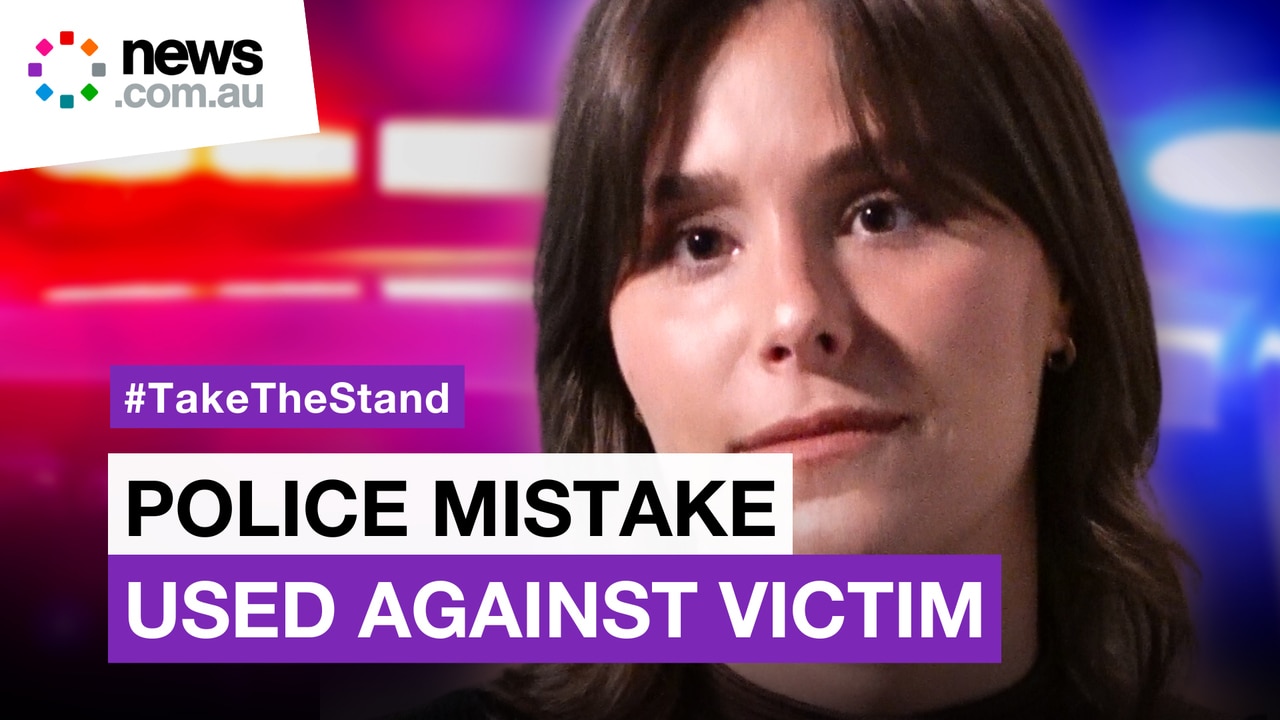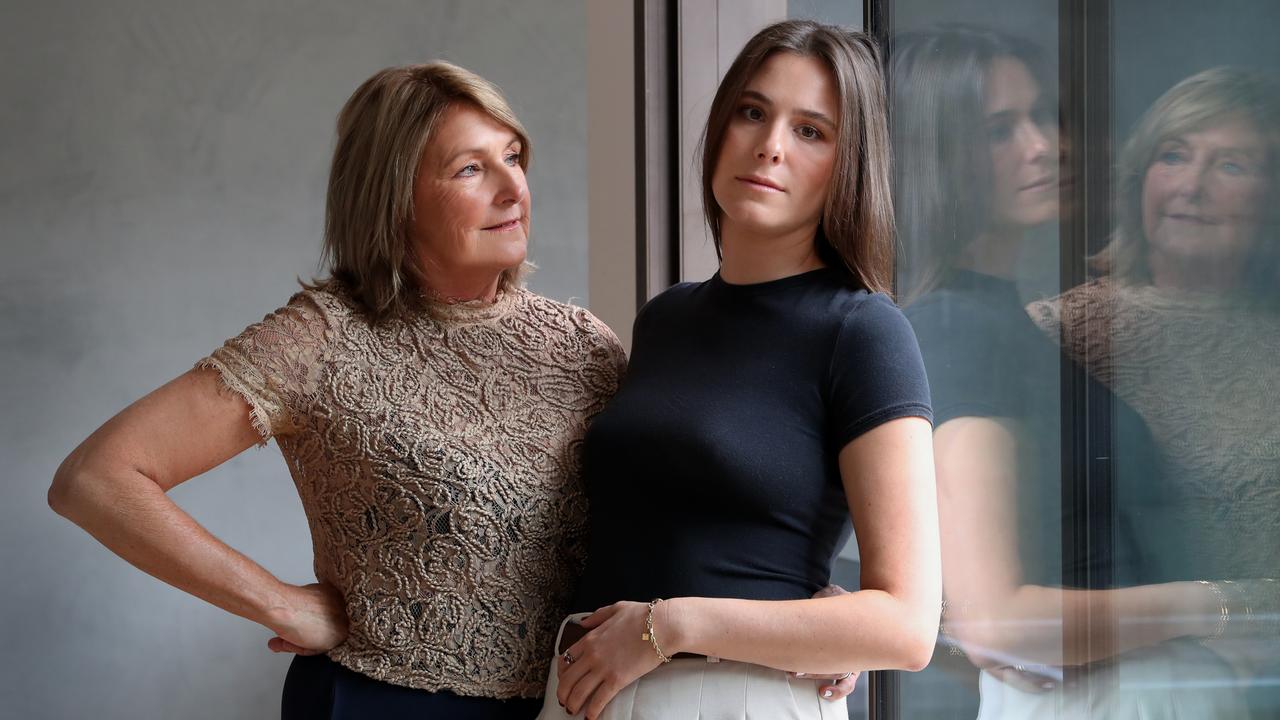‘Already gone wrong’: Proof Australian system needs to change
Sarah Rosenberg survived the unthinkable – only to be cruelly and publicly ridiculed at a party by a relative of her attacker.

EXCLUSIVE
When Sarah Rosenberg first made a report of rape, strangulation and suffocation to police in December 2019, she assumed that it would be the prosecution’s job to represent her in court.
“I wasn’t alone in this assumption,” says Ms Rosenberg, now 28, from Woollahra in Sydney’s eastern suburbs.
“Many family and friends I spoke to were also surprised to learn that the prosecution doesn’t represent me.”
Once Ms Rosenberg realised the prosecution’s job is to represent the state – not the individual – she asked if she could engage her own private lawyer at her family’s expense.
“I thought if it’s a financial issue, we’d pay ourselves. But it turns out I wasn’t allowed to do that either,” she says.
READ MORE: ‘It was rape’ Daughter’s awful revelation
As the law currently stands in NSW, sexual assault complainants do not automatically get legal representation and it is often not clear to whether they can retain their own lawyers.
“The trepidation I felt about the trial quickly turned to terror. (I wondered) ‘Who would stand up for me? Who would object if my rights or privacy were undermined, as I had heard about from so many others?’” Ms Rosenberg says.
“During two years of navigating the legal process in the lead up, so much had already gone wrong … knowing that no one was obliged to protect me in the trial itself left me feeling hopeless and angry.”
As Ms Rosenberg sat in the court witness box in April 2021, her parents waiting outside, she felt “like a sitting duck with no cover”.
The defendant, of course, was properly represented. He and his legal team had been preparing for months, having engaged lawyers even before charges had been laid.
“He was armed with the best weapons money could buy,” says Ms Rosenberg.

“The defendant had his top silks, the state was represented by the prosecution, but no one was there to represent me.”
Four and a half days of questioning was about to unfold.
“I knew at that moment I was completely alone.”
Since the trial, Ms Rosenberg has learnt that other countries deal with this issue very differently, permitting complainants in sexual offence matters to bring their own lawyers into criminal proceedings.
Countries including Canada, Ireland, Germany, India, Japan, Norway and Sweden, among others, have been allowing this for years.
The model is called Independent Legal Representation (ILR), and now, as executive director of a not-for-profit called With You We Can, Ms Rosenberg is fighting for ILR to be rolled out here in Australia.
As a result of her and others’ efforts, ILR is currently being piloted in Victoria, the ACT and Western Australia. NSW and QLD also already allow a limited version of ILR in certain circumstances, such as during pre-trial hearings concerning access to the complainant’s medical or counselling notes.
Ms Rosenberg hopes that if forthcoming evaluations of the Australian pilots align with what is known from research done on overseas models, ILR could be expanded across Australia. She hopes that other vulnerable individuals don’t have the same experience in court that she did.
“International researchers have found that ILR holds a host of benefits,” explains Ms Rosenberg, who helped co-design a national first study funded by the Australian Institute of Criminology on ILR, led by associate professor Mary Iliadis.
“Researchers have discovered that when complainants are able to access ILR they are more likely to report to police; they have enhanced confidence while testifying; and they experience a greater sense of procedural justice,” she says.


They are also more likely to report and stay engaged in the legal process if their privacy is protected through a lawyer.
Prof Iliadis, of the Deakin Network Against Gendered Violence, says that importantly, “ILR does not interfere with the accused’s right to a fair trial”. In fact, none of an accused’s rights are impacted by a complainant being afforded the right to have their own lawyer.
“If anything, it can lead to the better administration of justice for all,” adds Ms Rosenberg, stating that there are “many excellent reasons” to consider expanding ILR in Australia beyond the pilot model.
“ILR reduces intrusive questioning by defence and re-traumatisation. That has long-term health and economic benefits,” she says.
ILR also helps to clarify the role of the prosecution.
At present, the prosecution often finds themselves having to explain to sexual assault complainants that while they may be sympathetic, they are not ‘on side’ with them, and at times may have to act against the interests of the complainant.
“This can be very distressing and confusing,” says Ms Rosenberg, who, as executive director of With You We Can, has regular contact with sexual assault complainants and victim-survivors who have gone through criminal proceedings.
“From the moment the crime is reported, victims often tell me they feel like a mere passenger in the process – many feel they are treated like an afterthought, or an inconvenience. The re-traumatisation this causes is well-documented – in fact, nothing has the potential to replicate the dynamics of abuse more than being positioned as ‘just a witness’ in the accountability process.
“Likewise, many victims tell me they didn’t get to meet the prosecutor until the day of trial, and when they did, they often didn’t have time to ask questions. Others are scared to speak up if they perceive the prosecution is not doing their job appropriately, because they are fearful they might anger the prosecution or get them off side.”
The resulting power dynamic renders complainants even more vulnerable.
“When victims are unrepresented, they become dependent on the mercy and goodwill of the prosecution to raise any objection on their behalf,” she says.

Prosecutors can object to victims being harassed, intimidated or badgered on the stand, but they aren’t legally obliged to, and do so inconsistently at best.
“They certainly don’t take instruction from complainants,” explains Ms Rosenberg, who also sits on the Expert Advisory Group for the Australian Law Reform Commission’s current inquiry into Justice Responses to Sexual Violence.
“They are vulnerable, dependent and helpless in the equation, when the equation wouldn’t even exist without them.”
In Australia, each state and territory has adopted a Victim’s Charter of Rights, but these charters are not enforceable.
Some jurisdictions do have legislative safeguards, called rape shield laws, to help prevent defence counsel from interrogating a complainant about their sexual history or accessing their private counselling notes.
But in practice, it is usually left to the prosecution to enforce those protections through opposing or objecting to defence counsel tactics. This does not always happen. In Sarah’s case, she was asked more than 2000 questions by the defence. The DPP objected only once, on a technicality.
In the end, it means complainants do not have the same legal rights as the accused.
As part of the #TakeTheStand series, news.com.au spoke to a number of prosecutors, lawyers and former prosecutors. While no prosecutors would go on record, it was acknowledged that prosecutors will sometimes fail to object to a violation of a sexual assault complainant’s rights, because they do not want to elongate a trial, or risk getting off side with the judge.
Other times, a prosecutor may let a violation slide for their own tactical reasons, or because they did not understand the particular gravity, significance or impact of a privacy breach on the complainant, who they may have only known for a matter of hours.
Dr Rachael Burgin, senior lecturer at Swinburne Law School, says “judges also have a legal requirement to intervene if victim-survivors are being harassed on the stand, but analyses of court transcripts show they often fail to”.
“Some judges also hold concerns that too many interventions may offer the defence grounds for appeal.”

The result is a system where no one is specifically tasked with upholding the complainant’s rights. And protections for complainants are only as good as the prosecutor’s appetite to enforce them on the day.
Ms Rosenberg says that by contrast, having one’s own lawyer would “make a huge difference” for many sexual assault complainants, because – unlike the prosecution – they would be legally bound to act in the complainant’s best interest.
Reviewing her own case, Ms Rosenberg can pinpoint many examples where she believes ILR would have enhanced her access to justice.
“Prior to reporting, a lawyer could have given me information about what the process looked like so that I could make an informed decision about whether I wanted to proceed,” she says.
“When being asked to hand over my phone, a lawyer could have explained the implications of doing so and that I had the option to say no. They could have explained to me (how) defence (can) twist text messages, once they have them, in order to discredit a (complainant’s) character.
“When a relative of Joshua’s* read out my 27 page police statement at a party, mocking me, an independent lawyer could have raised a concern with the court on my behalf.
“When the defence obtained my medical and counselling records outside of the appropriate process, no one even noticed … having a lawyer would have been a huge asset then.”
Ms Rosenberg also says that a lawyer could have assisted when the prosecution failed to offer her breaks and failed to object to inappropriate questions.
“When I eventually filed a complaint against the DPP about other conduct which occurred, having my own lawyer at meetings with the DPP would also have helped level the playing field,” she says.
Ms Rosenberg says that for many complainants, the other huge advantage of an ILR is that they help case-manage investigations, while safeguarding complainants’ rights in the process.
According to Dr Rachael Burgin, “victim-survivors are often told by police that full co-operation shows honesty”. But lawyers spoken to by news.com.au said it is not only not necessary for complainants to co-operate fully with police, it is naive to.
Ms Rosenberg says that there is a lot of work to be done in Australia, but we appear to be moving in the right direction.
“Victims should not be bystanders in a system that would collapse without their co-operation,” she says.
“ILR offers a fairer justice system for us all. Ultimately, it can enhance everyone’s confidence in the integrity of our justice system.”
Nina Funnell is Walkley Award winning journalist and the creator of the Take the Stand campaign run in exclusive partnership with news.com.au. To support this independent journalism visit here
Read related topics:Take The Stand






